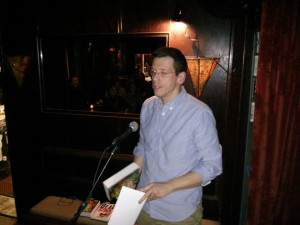So, in support of my new novel We Are Not Good People (you may have heard me mention it one billion times so far), I’ve been doing more public appearances than usual. Which is to say: More than none public appearances. I like meeting people who like my books, and enjoy conversations about books and such (especially if the conversation skews towards how awesome I am), but I also fear people and often feel very awkward with my fellow humans, so I don’t do a lot of public stuff.
But, when you have a novel you need to sell, you get out there and shake your awkward, slightly hairy ass (slightly?). I trooped to the Brooklyn Book Festival, I did a reading at Shade in Manhattan with some MWA peeps, I did a very short radio reading that I assume will go live at some point soon … I went to New York Comic Con this year as a guest speaker. All the public speaking got me thinking about it, and about book readings in general.
Jeff’s Guide to Reading in Public
I’ve done my share of book readings at this point. I’ve read in bars, in bookstores, to crowds and (literally) to no one. I’ve done my work. And so I have a few simple guidelines that I think work well for me. And, since I’ve also been an audience member at all these readings, I also think these rules of thumb would work for other writers as well.
The disclaimer is, your mileage may vary, and my limitations are not necessarily your limitations. So feel free to ignore my advice here. These are my general impressions after having been involved in a ton of readings over the years – take my advice or leave it.
- Don’t read dialogue. A section where two (or, god help us, more) characters are speaking can be really, really confusing to the audience. Your ability to do voices is probably not nearly as good as you think, and reading each line in the same nervous monotone makes figuring out which character is speaking really tough.
- Don’t read for more than 5-10 minutes. And lord, skewing closer to 5 is better. Time yourself at home. Trust me when I say no one wants to hear you drone on for 20 minutes, and if you’re sharing the night with other writers going long is just rude.
- Practice. I am always amazed when an accomplished writer with a lot of success publishing their work gets up, flips to a page in their book, and staggers through a section like they only recently learned to read, much less like they themselves actually wrote the words. You may think that because it’s your prose you’re golden, but trust me: Read it out loud a few times before the event rolls around.
- Edit. When you’re reading, you’ll probably hit a few moments when you stumble because reading out loud is different from reading in your head. Don’t be afraid to edit slightly to make it easier on yourself and easier for your audience to follow.
- Have fun. You’ll trip over words anyway, or mispronounce things, or trip over sound wires or something. Don’t worry. Just have fun, and remember this: Very few people will leap up from their chairs and rush out to buy your book based on a 5-minute reading. You’re there for the camaraderie and the exposure, not to start a cult.
Finally, try to choose a scene in your book that captures tone, but doesn’t require everyone know the plot – stopping to explain things just drags everything down.
Those are my thoughts. You are, of course, free to completely ignore me or even show up at my next reading and heckle me until I cry. At which point my wife will beat you up, so be careful.


People should pay attention to this cause I”ve seen you read, and you knock it out of the park. And I know parks.
Aw, shucks. I pay you to say that.